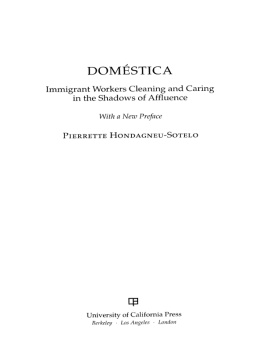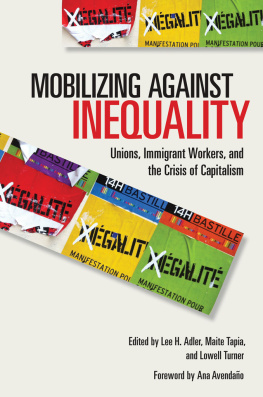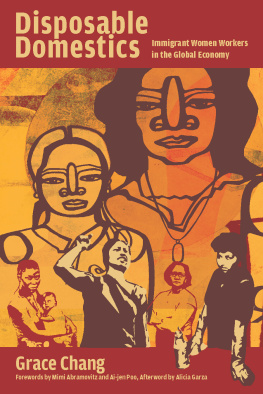Hondagneu-Sotelo - Doméstica: immigrant workers cleaning and caring in the shadows of affluence
Here you can read online Hondagneu-Sotelo - Doméstica: immigrant workers cleaning and caring in the shadows of affluence full text of the book (entire story) in english for free. Download pdf and epub, get meaning, cover and reviews about this ebook. City: Berkeley, year: 2007, publisher: University of California Press, genre: Home and family. Description of the work, (preface) as well as reviews are available. Best literature library LitArk.com created for fans of good reading and offers a wide selection of genres:
Romance novel
Science fiction
Adventure
Detective
Science
History
Home and family
Prose
Art
Politics
Computer
Non-fiction
Religion
Business
Children
Humor
Choose a favorite category and find really read worthwhile books. Enjoy immersion in the world of imagination, feel the emotions of the characters or learn something new for yourself, make an fascinating discovery.
- Book:Doméstica: immigrant workers cleaning and caring in the shadows of affluence
- Author:
- Publisher:University of California Press
- Genre:
- Year:2007
- City:Berkeley
- Rating:4 / 5
- Favourites:Add to favourites
- Your mark:
- 80
- 1
- 2
- 3
- 4
- 5
Doméstica: immigrant workers cleaning and caring in the shadows of affluence: summary, description and annotation
We offer to read an annotation, description, summary or preface (depends on what the author of the book "Doméstica: immigrant workers cleaning and caring in the shadows of affluence" wrote himself). If you haven't found the necessary information about the book — write in the comments, we will try to find it.
Hondagneu-Sotelo: author's other books
Who wrote Doméstica: immigrant workers cleaning and caring in the shadows of affluence? Find out the surname, the name of the author of the book and a list of all author's works by series.
Doméstica: immigrant workers cleaning and caring in the shadows of affluence — read online for free the complete book (whole text) full work
Below is the text of the book, divided by pages. System saving the place of the last page read, allows you to conveniently read the book "Doméstica: immigrant workers cleaning and caring in the shadows of affluence" online for free, without having to search again every time where you left off. Put a bookmark, and you can go to the page where you finished reading at any time.
Font size:
Interval:
Bookmark:
Acknowledgments
This is a story about domestic lives, and I owe a deep debt of gratitude to the women who allowed me to probe into the crevices of their lives and homes. They tolerated all sorts of intrusive, nosy questions that I would never consider asking them in other contexts, they sat and talked with me for hours, and they shared incredible stories of human resilience and tragedy. They may not agree with everything I have to say, but I hope that our mutual efforts eventually lead to greater justice.
The book is dedicated to Cristina Riegos, who was working toward that goal until her life was cut short by cancer. She brought tremendous creativity, charisma, and smarts to her job as an organizer among Latina immigrant domestic workers in Los Angeles. Because of her initial efforts, the Domestic Workers' Association, which I detail in the final chapter of this book, is still thriving.
I received research support from several funding sources. Most of the research was supported by a grant from the Social Science Research Council, through their Inter-University Program for Latino Research. At the University of Southern California, the Southern California Studies Center funded the research on domestic employment agencies, and the College of Letters, Arts, and Sciences provided Zumberge grant seed money to get this project off the ground. Funded research allowed me to hire research assistants who took on the monumental task of typing the verbatim transcriptions of the interviews, as well as other chores. For their efforts, I owe big thanks to Kim Huisman, Gloria Gonzlez-Lpez, Ernestine Avila, Jos Rodrguez-Pozeilov, Wendy de Boer, Cynthia Cranford, Maria Elena Espinoza, and Carrie Sutkin. Turning the research into a book became possible because I received in-town, in-residence writing fellowships at the Getty Research Institute and at the UCLA Chicano Studies Research Center.
Public and private conversations with many people furthered my thinking about this topic. Particularly helpful were audience questions and responses to presentations that I made at the Getty Research Institute; the International Sociological Association conference on International Cities at Humboldt University in Berlin; the Care Work, Gender, and Citizenship conference at the University of Illinois; colloquia at the Department of Ethnic Studies at UC San Diego and the Departments of Sociology at UC Berkeley and UC Irvine, as well as the Public Policy Institute at UCLA; the UC-Mexus meetings; seminars at El Colegio de la Frontera campus in Tijuana, El Colegio de Michoacn in Zamora, Michoacan, and at the Center for Working Families at UC Berkeley; American Sociological Association meetings in Toronto, San Francisco, and Chicago; and classroom discussions at UC Santa Barbara, UCLA, the College of William and Mary, and especially with students at USC. I hate being publicly challenged with tough questions, but my exposure to them, in all these settings, greatly helped this book evolve.
Commentary on particular chapters by good friends and colleagues also helped. Conversations with Mike Messner, Barrie Thorne, Laura Pulido, Elaine Bell Kaplan, Vilma Ortiz, Hector Delgado, Sarah Mahler, Barbara Laslett, Mary Romero, Patricia Fernndez-Kelly, Gul Ozygin, Pei-Chia Lan, Michael Burawoy, Deborah Stone, and the late Cristina Riegos also moved this project forward. Deborah Stone gave me a big gift when she read the entire manuscript with an eye trained in public policy and politics. When I needed information on Central American immigrants, Louis di Sipio and Cecilia Menjvar moved with the speed of light and graciously shared the results of their own research with me. Warm thanks to Naomi Schneider, my editor at the University of California Press, and to Alice Falk, an amazingly attentive copyeditor. Victor Narro, an attorney who runs the workers' rights program at the Coalition for Humane Immigrant Rights of Los Angeles, helped guide me through what seemed like gobbledygook in the legal codes, enabling me to write . Hctor Delgado deserves special recognition because he selflessly read and commented on many early drafts of chapters. He is one of the few professional-class men who actually engages with the nitty-gritty of social reproductive work, and does so with humor.
During the period I worked on this project, I experienced the metamorphosis of my sons Miles and Sasha from nearly preverbal, physically dependent little kids into, respectively, one caring, empathetic electric guitar player and one firecracker of boisterous energy that I siphon to replenish my inner reserves. Life at home with them and Michael Messnercompanion, confidant, morning coffee maker, and co-conspirator in all of thisproves that hard work can be lots of fun. It's never seamless, but let's keep those home fires burning.
| Text: | 10/13 Palatino |
| Display: | Palatino |
| Composition: | Binghamton Valley Composition |
| Printing and binding: | Maple-Vail Book Manufacturing Group |
New World Domestic Order
Contemplating a day in Los Angeles without the labor of Latino immigrants taxes the imagination, for an array of consumer products and services would disappear (poof!) or become prohibitively expensive. Think about it. When you arrive at many a Southern California hotel or restaurant, you are likely to be first greeted by a Latino car valet. The janitors, cooks, busboys, painters, carpet cleaners, and landscape workers who keep the office buildings, restaurants, and malls running are also likely to be Mexican or Central American immigrants, as are many of those who work behind the scenes in dry cleaners, convalescent homes, hospitals, resorts, and apartment complexes. Both figuratively and literally, the work performed by Latino and Latina immigrants gives Los Angeles much of its famed gloss. Along the boulevards, at car washes promising 100% hand wash for prices as low as $4.99, teams of Latino workers furiously scrub, wipe, and polish automobiles. Supermarket shelves boast bags of prewashed mesclun or baby greens (sometimes labeled Euro salad), thanks to the efforts of the Latino immigrants who wash and package the greens. (In addition, nail parlors adorn almost every corner mini-mall, offering the promise of emphasized femininity for $10 or $12, thanks largely to the work of Korean immigrant women.) Only twenty years ago, these relatively inexpensive consumer services and products were not nearly as widely available as they are today. The Los Angeles economy, landscape, and lifestyle have been transformed in ways that rely on low-wage, Latino immigrant labor.
The proliferation of such labor-intensive services, coupled with inflated real estate values and booming mutual funds portfolios, has given many people the illusion of affluence and socioeconomic mobility. When Angelenos, accustomed to employing a full-time nanny/housekeeper for about $150 or $200 a week, move to Seattle or Durham, they are startled to discover how the cost of living that way quickly escalates. Only then do they realize the extent to which their affluent lifestyle and smoothly running household depended on one Latina immigrant woman.
This book focuses on the Mexican and Central American immigrant women who work as nanny/housekeepers and housecleaners in Los Angeles, as well as the women who employ them. Who could have foreseen that at the dawn of the twenty-first century, paid domestic work would be a growth occupation? Only a few decades ago, observers confidently predicted that this occupation would soon become obsolete, replaced by labor-saving household devices such as automatic dishwashers, disposable diapers, and microwave ovens, and by consumer goods and services purchased outside of the home, such as fast food and dry cleaning. Instead, paid domestic work has expanded. Why?
Next pageFont size:
Interval:
Bookmark:
Similar books «Doméstica: immigrant workers cleaning and caring in the shadows of affluence»
Look at similar books to Doméstica: immigrant workers cleaning and caring in the shadows of affluence. We have selected literature similar in name and meaning in the hope of providing readers with more options to find new, interesting, not yet read works.
Discussion, reviews of the book Doméstica: immigrant workers cleaning and caring in the shadows of affluence and just readers' own opinions. Leave your comments, write what you think about the work, its meaning or the main characters. Specify what exactly you liked and what you didn't like, and why you think so.









